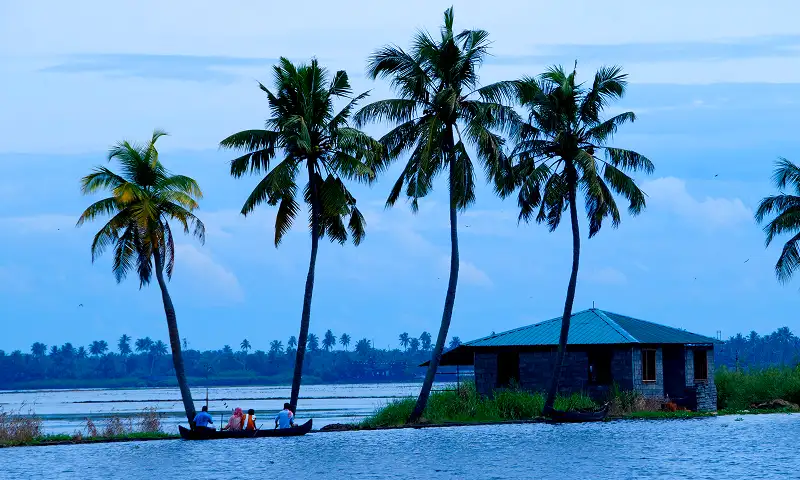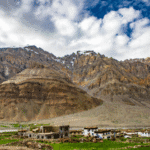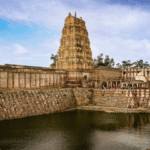
It’s early morning in Kerala. The sun rises over the still lagoons. The backwaters are calm, broken only by the oars as a fisherman glides his canoe for the day’s catch. On the banks, a woman bends over to wash utensils, her children laughing as they run barefoot on the narrow path. A houseboat drifts by, its visitors leaning over the railing, cameras ready to capture the scene. For the villagers, this is everyday life. For travellers it feels like a glimpse into another world. In the last few decades, the Kerala backwater tourism has become one of the famous tourist attractions. Visitors from around the world come to glide along the canals on a houseboat. But behind this postcard perfect view lies a delicate ecosystem and fragile way of life that can easily be disrupted. As tourism grows, it puts pressure. Unregulated tourism once threatened to turn the backwaters into a polluted and overcrowded attraction. To save this treasure, Kerala pioneered a bold experiment, responsible tourism. It is a model that places communities, sustainability and culture at the heart of travel. This blog by Memorable India unravels the story of Kerala Backwaters Responsible Tourism, its history, challenges, achievements and what travellers can do to keep this paradise alive:
Kerala’s backwaters stretch over 900 km, interlinking five major lakes with 38 rivers and countless canals. These waters are not stagnant lagoons but a dynamic ecosystem where fresh water rivers merge into the Arabian Sea, creating a landscape both tranquil and vibrant. The ecological role of the backwaters is immense. They regulate floods, act as nurseries for fish and prawns and provide fertile soil for paddy cultivation. The region of Kuttanad, known as the “Rice Bowl of Kerala,” is particularly famous for its farming below sea level. This is a rare agricultural practice that is globally recognised.
Beyond ecology, the Kerala backwaters are also cultural landscapes. Generations of families live in villages along the canals with houses built close to the water’s edge. Here, people use the boats the way others use bicycles or cars for commuting, transporting goods and even attending schools. Festivals, songs and cuisine in these areas are influenced by the water around them. This interdependence of people and nature makes the backwaters far more than a tourist attraction. They are a living heritage that needs careful protection.
Kerala began promoting itself as ‘God’s Own Country’ in the 1990s and the backwaters quickly became the face of this campaign. Alleppey, Kumarakom, and Kovalam became popular hubs for houseboat cruises. For many travellers spending a night on a Kettuvalam became a once-in-a-lifetime experience. Kerala backwater tourism brought unreliable opportunities. Thousands of young people found jobs as boat crew, cooks, guides and drivers. Local farmers and fishermen benefited from the demand for fresh produce. Artisans found new markets for handicrafts. The state economy also enjoys the steady flow of international and domestic visitors.
But this success came with strain. The number of houseboats multiplied rapidly. Many operate without proper waste management systems. Diesel powered engines of these houseboats polluted the water. While some areas become overcrowded with so many boats that the quiet charm of the backwaters is lost. Villagers begin to feel pressure from tourist behaviour and the cultural authenticity of certain practices was diluted for commercial gain. The challenge was clear: how to preserve the charm of the backwaters while continuing to welcome tourism.
In 2017, Kerala launched the responsible tourism mission. It was one of the first state-led efforts in India to formally address the balance between tourism and sustainability. The mission has three main goals:
The main objective of this mission is to empower local communities by ensuring they directly benefit from tourism activities. It focuses on providing income and livelihood opportunities for farmers, artisans and women through tourism related activities. This is one of the strongest features of Kerala’s responsible tourism model. Unlike conventional tourism, where profits often flow to big companies, this mission emphasises making villagers central stakeholders. In backwater villages, homestays have become popular. Instead of staying in luxury resorts, visitors can live in family homes, eat traditional meals and take part in daily activities like fishing and coir rope making. This supports local families financially and also gives travellers a deeper cultural connection. It offers a fair share of the economic benefits that reduce poverty and improve the living standards of the locals. Farmers were encouraged to sell vegetables and fish to hotels and houseboats. Many women who previously had no independent income now support their families through tourism-linked work.
The idea is simple but powerful when locals feel ownership over tourism, they protect their environment and culture more strongly. Tourism becomes a partnership rather than an intrusion. Communities felt included, tourists gained a more authentic experience and backwaters began to recover from the strain of unchecked tourism. locals
Tourism in the backwaters can not survive without ecological care. Eco tourism in Kerala backwaters reduces the environmental impacts of tourism by encouraging eco friendly practices. This mission focuses on minimising the negative environmental impacts such as littering publicly, throwing garbage, polluting water, etc. and promoting a responsible water management process. Here are some sustainable steps taken under this mission:
These practices show how responsible tourism in Kerala blends ecological protection with economic activities. Without them, the backwaters risk losing their health and charm.
Kerala’s culture is as rich as its landscape. Responsible tourism works to protect the culture and heritage of Kerala, making sure that traditions are respected and promoted rather than exploited. This mission is supporting the preservation of centuries-old traditions from fishing techniques to the boat building process. It emphasises that visitors should experience this culture respectfully and meaningfully. This eco tourism in Kerala backwaters offers you a chance to interact with locals and learn about their life and culture that defines the state.
Performing arts like Kathakali and Mohiniyattam are showcased in village halls allowing travellers to witness them in their authentic settings rather than on commercial stages. Crafts like coir rope weaving and pottery are kept alive by inviting visitors to learn from artisans. Festivals such as Vallam Kali are promoted as community events where tourists can watch the spirit of Kerala that remains rooted in tradition. This approach ensures that culture is not turned into a showpiece but remains vibrant and relevant for both locals and visitors.
Sustainable travel in Kerala mission has started not just for above mentioned reasons but also to preserve the environment for our future generations. This mission is built on the environmental stewardship principle. This principle ensures that the natural beauty of backwaters remains untouched for our future generations. By following eco tourism practices like reducing water, minimising over-resource consumption, respecting culture and traditions, and protecting wildlife can ensure that the ecosystem continues to flourish. Both locals and tourists understand the importance of responsible tourism and support conservation to protect this beauty for our generations to come.
More visitors mean more boats and more waste on the environment. While government and communities play a role travellers themselves are equally important in making tourism responsible. If you want a sustainable Kerala houseboat tour, then you should be the one to try your hand first. You can opt for some small alternatives like choosing eco-friendly accommodations, sustainable transportation, and reducing waste to support and respect the environment and the culture of the state. Here are a few things that you should consider:
When travellers approach the backwaters not just as spectators but as respectful guests, the tourism experience becomes more rewarding for everyone. We, Memorable India, are also promoting sustainable tourism practices to ensure that every tourist is educated about the preservation of natural beauty and the heritage of Kerala. Our team works to support local artisans and shops to provide them with employment opportunities. We offer personalised, eco-friendly tour itineraries that allow you to explore the backwaters without leaving environmental impacts. Our experts design your Kerala houseboat tour to ensure that you can enjoy a tour rich in eco-friendly amenities. We also follow strict guidelines to check and certify that our activities don’t harm the environment.
Despite progress, challenges on the way to sustainable Kerala tourism continue. You can witness that some houseboats still flout waste management rules with irresponsible behaviour. Overcrowding in Alleppey during October to March, the best time to visit Kerala backwaters, remains a concern. Along with all this, climate change is another looming threat, with rising sea levels and unpredictable weather affecting the backwater ecosystem. The Responsible Tourism Mission must constantly adapt, strengthening monitoring systems and encouraging new sustainable practices. Success is not a one-time achievement but an ongoing process.
Kerala’s vision for the future is clear; tourism should be carbon neutral, inclusive and resilient. Plans include expanding eco-certification programs for all tourism operators. It also includes promoting digital platforms for local artisans. The Kerala backwaters responsible tourism is also focusing on making climate adaptation part of backwater management to avoid the hassle of determining the best time to visit the Kerala backwaters and so on. If these goals are met, the Kerala backwaters tour will not only remain a beloved tourist destination but also a global example of how tourism and sustainability can work together.
The backwaters of Kerala are a way of life, an ecosystem and a cultural treasure. Tourism here must therefore be more than sightseeing. It must be an act of partnership to protect the harmony of this region. Kerala backwaters responsible tourism shows that when communities, government and travellers share responsibility, it is possible to protect nature, celebrate culture and support livelihood. For travellers planning a Kerala backwaters tour is a chance to enjoy their beauty and to contribute to their preservation for the future. By choosing wisely and acting respectfully, every visitor becomes part of the story of keeping Kerala’s backwaters alive for the future. If you are also a responsible tourist, book your Kerala backwaters tour with Memorable India to promote sustainable tourism. To enquire more, ring or WhatsApp us now. We are happy to assist you at every step!

12 Best Places for a Honeymoon in Himachal Pradesh and Uttarakhand
26 Feb 2026
11 Places Every American Tourist Should Visit in India
25 Feb 2026
10 Best Famous Temples to Visit in Karnataka
24 Feb 2026
13 Top Things to Do in Sikkim for an Eventful Holiday
24 Feb 2026
13 Best Nature Weekend Tours In and Around Karnataka
23 Feb 2026